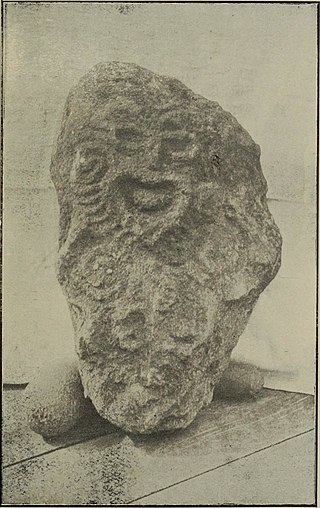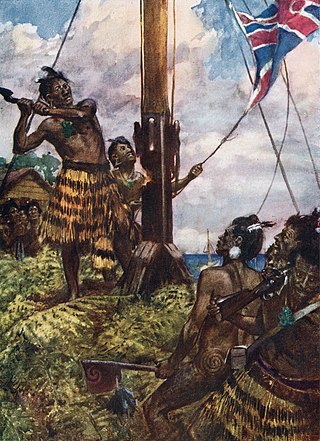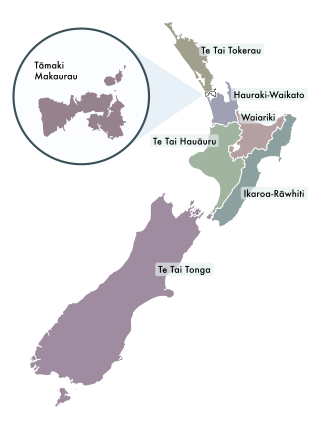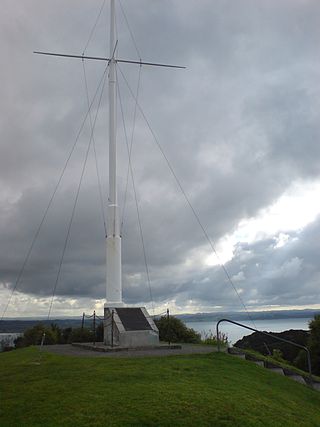Related Research Articles

In Māori mythology, Rongo or Rongo-mā-Tāne is a major god (atua) of cultivated plants, especially kumara, a vital crop. Other crops cultivated by Māori in traditional times included taro, yams (uwhi), cordyline (tī), and gourds (hue). Because of their tropical origin, most of these crops were difficult to grow except in the far north of the North Island, hence the importance of Rongo in New Zealand.

The Flagstaff War, also known as Heke's War, Hōne Heke's Rebellion and the Northern War, was fought between 11 March 1845 and 11 January 1846 in and around the Bay of Islands, New Zealand. The conflict is best remembered for the actions of Hōne Heke who challenged the authority of the British by cutting down the flagstaff on Flagstaff Hill at Kororāreka. The flagstaff had been a gift from Hōne Heke to James Busby, the first British Resident. The Northern War involved many major actions, including the Battle of Kororāreka on 11 March 1845, the Battle of Puketutu on 8 May 1845, the Battle of Ōhaeawai on 23 June 1845 and the siege of Ruapekapeka Pā from 27 December 1845 to 11 January 1846.

The Dog Tax war was a confrontation in 1898 between the Crown and a group of Northern Māori, led by Hone Riiwi Toia, opposed to the enforcement of a 'dog tax'. It has been described by some authors as the last gasp of the 19th-century wars between the Māori and European settlers. It was, however, a bloodless "war", with only a few shots being fired. Hōne Heke Ngāpua, MHR for Northern Māori, was responsible for de-escalating the confrontation.

Tāmati Wāka Nene was a Māori rangatira (chief) of the Ngāpuhi iwi (tribe) who fought as an ally of the British in the Flagstaff War of 1845–46.

Hōne Wiremu Heke Pōkai, born Heke Pōkai and later often referred to as Hōne Heke, was a highly influential Māori rangatira (chief) of the Ngāpuhi iwi (tribe) and a war leader in northern New Zealand; he was affiliated with the Ngati Rahiri, Ngai Tawake, Ngati Tautahi, Te Matarahurahu and Te Uri-o-Hua hapū (subtribes) of Ngāpuhi. Hōne Heke fought with Hongi Hika, an earlier war leader of the Ngāpuhi, in the Musket Wars. Hōne Heke is considered the principal instigator of the Flagstaff War in 1845–46.

In New Zealand politics, Māori electorates, colloquially known as the Māori seats, are a special category of electorate that give reserved positions to representatives of Māori in the New Zealand Parliament. Every area in New Zealand is covered by both a general and a Māori electorate; as of 2020, there are seven Māori electorates. Since 1967, candidates in Māori electorates have not needed to be Māori themselves, but to register as a voter in the Māori electorates people need to declare that they are of Māori descent.

Sir Peter Henry Buck, also known as Te Rangi Hīroa or Te Rangihīroa, was a prominent New Zealand anthropologist and an expert on Māori and Polynesian cultures who served many roles through his life: as a physician and surgeon; as an official in public health; as a member of parliament; and ultimately as a leading anthropologist and director of the Bishop Museum in Hawaii.
New Zealand's Top 100 History Makers was a weekly television programme first shown on Prime Television New Zealand on 6 October 2005. 430 notable New Zealanders were ranked by a panel to determine the 100 most influential in New Zealand history. There were six episodes to present the list, and a final (seventh) episode, screened live on 17 November 2005, showed the rankings of the top ten of these people as a result of votes collected from the public via text and internet..

The Tohunga Suppression Act 1907 was an Act of the New Zealand Parliament aimed at replacing tohunga as traditional Māori healers with western medicine.

Evan Paul Moon is a New Zealand historian and a professor at the Auckland University of Technology. He is a writer of New Zealand history and biography, specialising in Māori history, the Treaty of Waitangi and the early period of Crown rule.

Flagstaff Hill overlooks the Bay of Islands, New Zealand. Directly north of the small historical village of Russell, the flagstaff on the hill played a significant role in early relations between the local Māori of the Ngāpuhi iwi and early British colonials.

Hōne Heke Ngāpua was a Māori and Liberal Party Member of Parliament in New Zealand. He was born in Kaikohe, and was named after his great-uncle Hōne Heke. Ngāpua is best remembered for his advocacy for Te Kotahitanga, sponsorship of Māori autonomy in Parliament through a Native Rights Bill, and his successful intervention in the Dog Tax War of 1898.
The Hapu Party was a Māori political party in New Zealand that was formed in August 2008 and contested the Te Tai Tokerau seat in the 2008 general election. The party was led by David Rankin, a leader of the Matarahurahu hapū of Northland.
Eparaima Te Mutu Kapa was a 19th-century Māori member of the New Zealand parliament.
The Mana Movement, originally known as the Mana Party, is a former political party in New Zealand. The party was led by Hone Harawira who formed it in April 2011 following his resignation from the Māori Party. Harawira won the by-election in Te Tai Tokerau of 25 June 2011 for the Mana Party and retained the seat during the 2011 general election in November.
Tītore, sometimes known as Tītore Tākiri, was a rangatira (chief) of the Ngāpuhi iwi (tribe). He was a war leader of the Ngāpuhi who lead the war expedition against the Māori tribes at East Cape in 1820 and 1821. He also led the war expeditions to Tauranga and Maketu in 1832 and 1833, following the Girls' War incident at Kororāreka in the Bay of Islands.
Hone Heke Rankin, also known as John Rankin, was a New Zealand tribal leader, medical worker and farmer. Of Māori descent, he identified with the Ngā Puhi iwi. He was born in Gisborne, New Zealand, in 1896 to Matire Ngapua of Ngā Puhi, and her husband, John Claudian (Claudius) Rankin, a Scottish immigrant. Matire Ngapua's brother was Hōne Heke Ngāpua, a Member of Parliament.

Tracey Kathleen Dorothy McIntosh is a New Zealand sociology and criminology academic. She is of Māori descent and is currently a Professor of Indigenous Studies and Co-Head of Te Wānanga o Waipapa at the University of Auckland.
The 1901 Northern Maori by-election was a by-election for the seat of Northern Maori during the 14th New Zealand Parliament. The election was held on 9 January 1901.
Wairangi was a Māori rangatira (chieftain) of the Ngāti Takihiku hapu of the Ngāti Raukawa iwi in the Tainui tribal confederation from the Waikato region, New Zealand and the ancestor of the Ngāti Wairangi hapū. He probably lived in the mid-seventeenth century.
References
- ↑ "Northerrn Maori Election". The New Zealand Herald . 22 March 1909.
- ↑ "Northern Maori Election". Manawatu Herald. 23 March 1909.